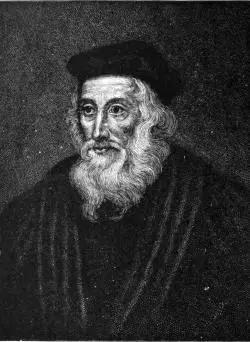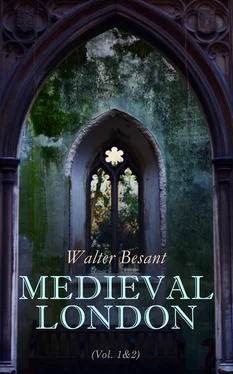In the same year the City was visited by a company of Flagellants. They were Dutch and a hundred and twenty in number. They marched through the streets stripped to the waist, wearing hats with one red cross before and one behind: in their hands they carried whips. They sang a Litany as they walked, and then began to flagellate each other till the blood ran down their bodies. This they are said to have done twice a day either in the streets or in St. Paul’s.
In the disturbances and quarrels which marked the conclusion of the third Edward’s reign and the commencement of Richard’s, it is difficult to separate the part taken by London from the general history of the country. It was a gloomy time for London as well as for the nation: the conquests and the vast possessions acquired by Edward had been lost more quickly than they were won. In 1372 the English fleet was destroyed off Rochelle: in 1373 Poitiers was lost and the English army destroyed: in 1374 Aquitaine was lost: our holding in France was reduced to certain strong places, as Bordeaux and Calais: the King was falling into dotage: the Black Prince was dying: not only the pride of the country was humiliated, but her wealth was impoverished and her trade diminished.
New ideas were rising up in all directions, precursors of the Reformation. Wyclyf wanted a return to simpler external forms and the lowering of the pride and wealth and power of the Church. Piers Plowman spoke for the inarticulate: Chaucer shows the kindly and good-humoured contempt of the well-to-do bourgeois for Friar and Monk: the commons demanded the dismissal of the Clergy from Civil Service: a few years later they petitioned the King (Henry IV.) to suppress all the monastic Houses. And the most powerful noble in the land, John of Gaunt, espoused the popular side and stood forth as the protector of Wyclyf and of John of Northampton.
Unfortunately John of Gaunt meddled with trade. Probably in ignorance of what he was doing he placed himself in the hands of a merchant named Richard Lyons in whom he seems to have had great confidence. Lyons was clearly the predecessor of many who have followed him in the endeavour to make fortune by short cuts; he got from John permission to ship his wool without taking it first to the Staple, thus avoiding the tax; he got himself made farmer of customs at Calais and levied higher duties than those imposed by Parliament; he bought up the King’s debts at a large reduction and made the Council pay him in full; he made corners, obtained and sold monopolies.
In 1376, the year before the old King’s death, the Good Parliament sat. Their speaker, Peter de la Mare, in the name of the Commons refused all supplies so long as the Duke of Lancaster, Lord Latimer, and Sir Richard Sturrie remained counsellors to the King, and so long as Alice Perrers remained the King’s concubine. The charge was allowed. Then the Parliament considered certain abuses in the City. First, they impeached Richard Lyons, “of divers deceits, Extortions, and other Misdemeanours, as well at the Time when he repaired to certain of the King’s Council, as when he was Farmer of the Subsidies and Customs; and especially for his obtaining Licences for the Exportation of large Faizons of Wool and staple Ware; for procuring new Impositions upon staple Ware; for devising the Change of Money; for making the King, for one Chevizance of twenty Marks, to pay thirty Pounds; for buying Debts of divers Men due by the King for small Values; for taking Bribes by way of Brokage for paying the King’s just Debts. All which, it seems, he was guilty of, by tampering with the Council.
To some Part of which Articles Richard answered, and to the rest submitted himself to the King’s mercy; Whereupon he was committed to Prison, and his Estate, both real and personal, confiscated, and for which Crimes he was also disfranchised.
John Peach of London was soon after impeached for procuring a Licence under the Great Seal, for the sole Privilege of selling sweet wine in London; it was said that by colour of this Grant, he took of every Vintner four shillings and fourpence for every tun he sold. The which he justified, as lawfully he might; yet nevertheless he was adjudged to prison, and to make Restitution to all Persons aggrieved. Whereupon the Grant was reversed, and the Citizens restored to their ancient Right of selling such Wine, under the Restriction of having the Price thereof always regulated by the Mayor.” (Maitland, vol. i. p. 134.)
The Parliament, however, came to an end. John of Gaunt returned to power; Richard Lyons and John Peach were let out of prison; the late Speaker, Peter de la Mare, was committed to Nottingham Castle; Alice Perrers went back to the King.

JOHN WYCLYF (d. 1384)
From MS. Harl. 4866.
It does not belong to this history to attempt an estimate of the character and the political career of John of Gaunt. Yet it may be mentioned that he was regarded with the deepest jealousy and was suspected of designs upon the Crown; for it was considered it might be easy for him to supplant the young prince Richard. Yet he was undoubtedly the greatest and most powerful noble in the land. Moreover, in matters of religion he took the side of Reform, especially as regards the wealth and power of the higher clergy. In this respect he undoubtedly had with him the general opinion of the City, both of the better sort—Whittington, among others, was reputed to lean in that direction—and of the craftsmen, among whom the Friars and their teaching had great influence. Unfortunately he offended the City beyond all power of forgiveness by proposing to abolish the Mayoralty and to encroach further upon their liberties. And then came the famous trial of Wyclyf in St. Paul’s Cathedral. Wyclyf was summoned to appear at St. Paul’s before the Archbishop of Canterbury and the Bishop of London to answer certain charges as to opinions.
He obeyed, but there came with him his protector, John of Gaunt, and the Earl Marshal, with, one doubts not, a sufficient following to protect their persons. The Cathedral was filled with people drawn together by the desire to see and to hear this fearless champion of Reform. It was with difficulty that the party could work their way through to the place of hearing, which was the Lady Chapel. The Earl Marshal exercised his authority, perhaps loudly, to keep the people back. The Bishop of London, indignant at the exercise of any authority but his own in his own Cathedral, declared that had he known how Lord Percy would act he would have forbidden him admission. The Duke of Lancaster with equal heat assured the Bishop that the Lord Marshal would maintain order, despite him. When they reached the Lady Chapel, the Earl Marshal demanded a seat for Wyclyf. The Bishop refused. Then angry words passed and recriminations; it was rumoured that John of Gaunt threatened to drag the Bishop out of the Church by the hair of his head. The quarrel grew to a tumult; the Court was dissolved; Wyclyf, who had said nothing, withdrew, and the Duke with his party left the Church and rode to the house of one John de Ypres.
There was rancour against the Duke of Lancaster for other reasons, apart from this insult to the Bishop. It was rumoured that he had the design of abolishing the Mayor and of appointing a Custos in his place; and that he held that the Marshal of England should have the right of arresting criminals in London as well as in other parts of the kingdom. The quarrel at St. Paul’s was only the last drop in the cup. That strange wildfire which seizes mobs, beginning one knows not where, and spreading one knows not how, flamed up in the London streets. The mob would have the Duke’s life. He, who was at the house of John de Ypres in the City, and at dinner, was startled by one of his knights who came to warn him. There was no time to be lost; he rose from table and hastening down to the nearest stairs took boat across the river and went to the Palace at Kennington. When the mob found that he was gone they came to his Palace of the Savoy, where they murdered a priest, and would have wrecked the palace but for the intervention of the Bishop of London.
Читать дальше













